| Revision as of 02:02, 29 December 2006 editR9tgokunks (talk | contribs)Extended confirmed users20,557 edits Reverted vandalism by User:LUCPOL, its becoming more apparent that you are trying to drive your personal opinions on other people, even if they say you are wrong.← Previous edit | Revision as of 02:50, 29 December 2006 edit undoLUCPOL (talk | contribs)6,608 edits + imageNext edit → | ||
| Line 20: | Line 20: | ||
| ]]] | ]]] | ||
| ]]] | ]]] | ||
| ]]] | |||
| ]]] | ]]] | ||
| ]]] | ]]] | ||
Revision as of 02:50, 29 December 2006
For other uses, see Metropolis (disambiguation).
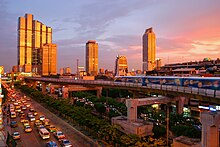

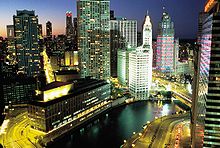
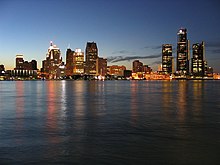



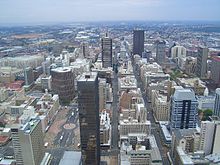







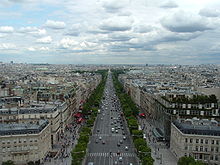




A metropolis (in Greek μήτηρ, mētēr = mother and πόλις, pólis = city/town) is a major city, in most cases with a population of at least one million inside its urban area, and over half million inhabitants in the city proper . It is usually a significant economical, political and cultural center for some country or region, and an important hub for regional or international connections and communications. The plural of the word is most commonly "metropolises", though sometimes the Greek plural "metropoleis" is used, especially in academic writing or writings about ancient Greek history.
In a broader sense it refers to the city or state of origin of a colony (as of ancient Greece), a city regarded as a center of a specified activity, or a large important city.
Antiquity
In the past, metropolis was the designation for a city or state of origin of a colony. Many large cities founded by ancient civilizations have been considered important world metropoleis of its time due to their large populations and importance. Examples include Alexandria, Antioch, Athens, Babylon, Benares, Carthage, Constantinople, Corinth, Damascus, Dholavira, Ephesus, Harappa, Jerusalem, Nanjing, Nineveh, Mohenjo-daro, Rome, Siracuse, Tenochtitlan, Tikal and Ur. Some of these ancient metropoleis survived until the modern days and are among the world's oldest continuously inhabited cities.
Etymology and modern usage
The word comes from the Greek metropolis ("mother city"), which is how the Greek colonies of antiquity referred to their original cities, with whom they retained cultic and political-cultural connections. The word was used in post-classical Latin for the chief city of a province, the seat of the government, and in particular ecclesiastically for the seat or see of a metropolitan bishop to whom suffragan bishops were responsible. This usage equates the province with the diocese or episcopal see.
In modern usage the word is also used for a metropolitan area, a set of adjacent and interconnected cities clustered around a major urban center. In this sense "metropolitan" usually means "spanning the whole metropolis" (as in "metropolitan administration"); or "proper of a metropolis" (as in "metropolitan life", and opposed to "provincial" or "rural").
Global/World city
The concept of a Global city (or a World city) means a city that has a direct and tangible effect on global affairs through socioeconomic, cultural, and/or political means. The term has become increasingly familiar, because of the rise of globalization (i.e., global finance, communications, and travel). An attempt to define and categorise world cities by financial criteria was made by the Globalization and World Cities Study Group & Network (GaWC), based primarily at Loughborough University in England. The study ranked cities based on their provision of "advanced producer services" such as accountancy, advertising, finance and law. The Inventory identifies three levels of world cities and several sub-ranks (See World cities ranking).
A metropolis isn't necessarily a global city, or being one, it could not be among the top ranking due to its standards of living, development, and infrastructures.
Local definitions by country
Canada
Statistics Canada defines a census metropolitan area as one or more adjacent municipalities situated around a major urban core where the urban core has a population of at least 100,000.
India
In India, the Census Commission defines a metropolitan city as one having a population of over 4 million. . Mumbai, Delhi, Bangalore, Hyderabad, Kolkata and Chennai are the six cities that qualify. Residents of these cities are also entitled to a higher House rent allowance. The figure only applies to the city region and not the conurbation.
United Kingdom
Various conurbations in the United Kingdom are considered to be metropolitan areas (see Metropolitan county). The term 'Metropolis' itself is rarely used. London is archaically referred to as 'the Metropolis', although in more recent times the term has also been used to describe Bolton by some of it citizens, albeit in a tongue-in-cheek fashion.
United States
In the United States an incorporated area or group of areas having a population more than 50,000 is required to have a metropolitan planning organization in order to facilitate major infrastructure projects and to ensure financial solubility. Thus, a population of 50,000 or greater has been used as a de facto standard in the United States to define a metropolis. A similar definition is used by the United States Census Bureau. They define a metropolitan statistical area as at least one urbanized area of 50,000 or more inhabitants.
Metropole
Main article: MetropoleLike in the UK, in French and Portuguese language, the cognate word métropole (Fr.) / metrópole (Port.), designates the part of a country near or on the European continent; in the case of France, this would mean France without its overseas departments; for Portugal during the Portuguese Empire period, it used to be common to designate Portugal except its colonies (the Ultramar).
Metropoleis today
According to the main definition at the top of this article, worldwide examples of modern-day metropoleis by continent include:
Africa
Asia
Europe
Oceania
The Americas
Notes and references
- A full member is either a capital city or a city with more than one million inhabitants, City Mayors: Metropolis World Congress. Retrieved 15 July 2006.
- The United Nations has set up its own classifications scheme: a "big city" is a locality with 500,000 or more inhabitants; a "city" is a locality with 100,000 or more inhabitants; an "urban locality" is a locality with 20,000 or more inhabitants; a "rural locality" is a locality with less than 20,000 inhabitants..., Sociumas magazine. Retrieved 15 July 2006.
See also
- Ecopolis (city)
- Ecumenopolis
- Ekistics
- Global city
- Large Cities Climate Leadership Group
- Megalopolis
- Sister city
- Cottonopolis